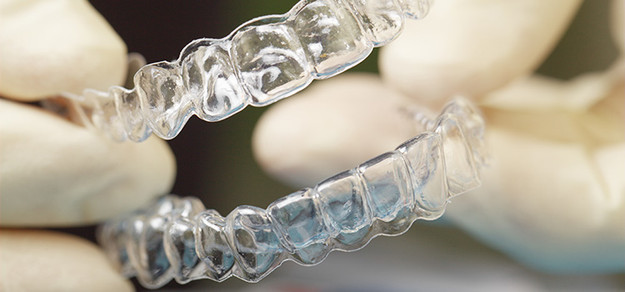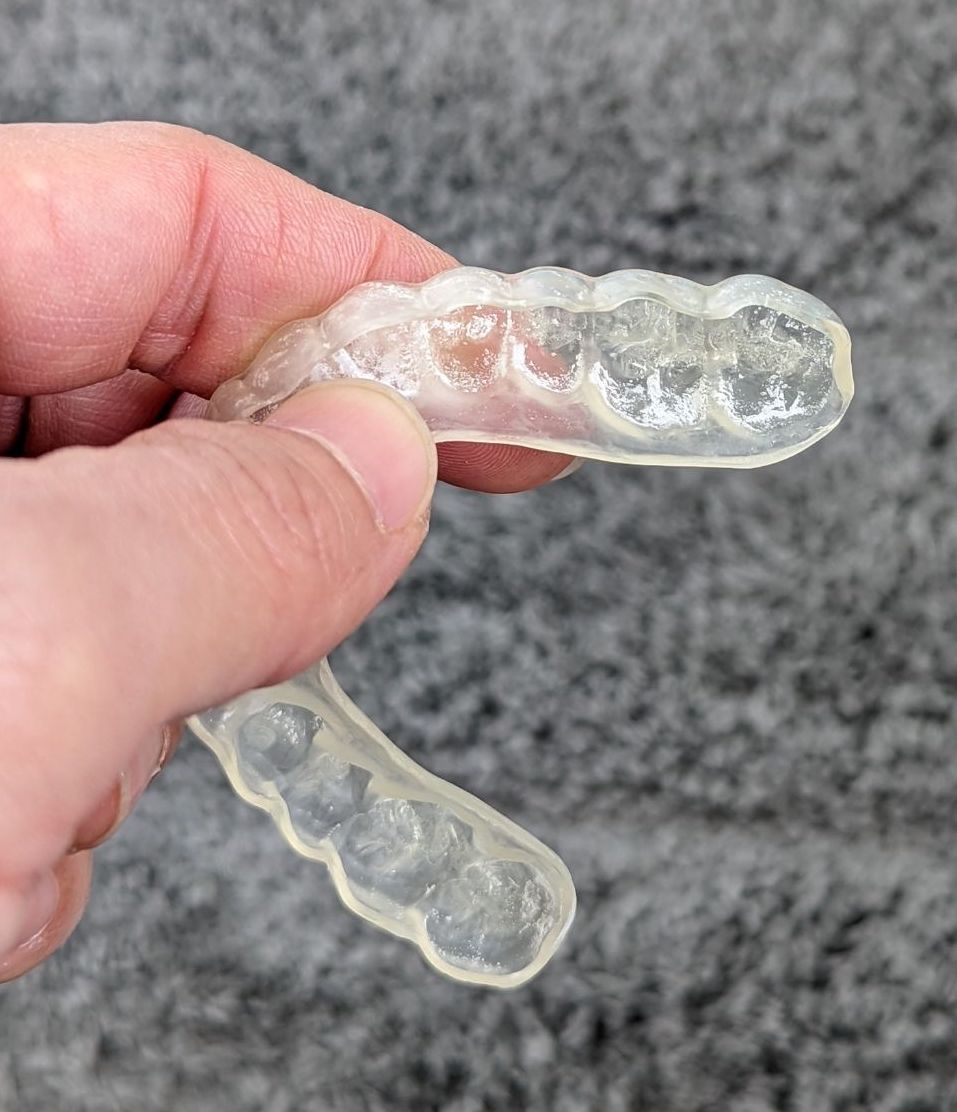How To Remove Calcium Buildup On Night Guards
12th Dec 2021

Mouthguards for bruxism protect you from the harmful effects of teeth grinding, so keeping yours in good shape is important for your oral health. Calcium buildup is inevitable, but there are measures you can take to prolong the life of your mouthguard and avoid premature buildup. Learning how to remove calcium buildup on your night guard is one way to keep your oral appliance in good condition and even prolong its lifespan.

Best Way To Remove Calcium Buildup
In this article, we are going to explain the best way to remove calcium buildup on night guards, how to take proper care of the night guard, and when is it time to replace it with a new one.
What Does Calcium Buildup on Mouth Guards Look Like?
If you don’t know what calcium buildup on your mouth guard looks like, you may not even realize that it’s starting to develop. Typically, calcium deposits appear as hard, crusty white spots on your night guard. Occasionally, calcium buildup might also appear as yellow stains. This can happen on all dental appliances, such as mouthguards, night guards, retainers, and clear aligners.
The buildup may begin as a small spot, and it will likely grow over time if you’re not regularly cleaning your night guard. This is why it’s important to keep a close eye on the condition of your night guard.

Why Does Calcium Accumulate on Mouthguards?
Our mouths are full of many kinds of bacteria, so bacterial growth on a mouthguard is both common and normal. In fact, there are over 6 billion bacteria in our mouths at any given time (How et al 2016). Of these bacteria, some are necessary and healthy, while others are harmful. Johnson & Johnson explains, “certain healthy bacteria work to protect your mouth (some, for example, specifically help limit tooth decay). There's also harmful bacteria that are known to cause cavities and disease”. When bacteria combine with tartar, plaque buildup, and saliva, calcium spots can form. This is a normal and natural process, and it doesn’t mean your mouth is dirty.

How to Avoid Calcium Buildup
It’s much easier to avoid calcium buildup in the first place than it is to remove buildup after it has already happened. To avoid calcium buildup, clean your night guard after each use and deep clean it regularly. Typically, it is recommended that you give your night guard a deep clean once a week. A clean night guard is an effective night guard. Try any of the following methods to clean your night guard:
- Brush your night guard with a soft-bristled toothbrush and non-abrasive toothpaste
- Clean your night guard with denture cleaner (cleaning tablets) or mouthwash (but avoid mouthwash that contains alcohol)
- Soak your night guard in white vinegar or hydrogen peroxide
- Brush a paste of water and baking soda onto your night guard
- Clean your night guard with household dish soap (make sure it is antibacterial soap)
Bleach is not a recommended cleaning method because it is a harmful chemical that can actually damage the guard.
Regardless of the cleaning method you use for your night guard, thoroughly rinse it off after you’re done cleaning. When you rinse, use warm or cool water; hot water can ruin the fit of a custom night guard. Then, either dry your night guard with a soft towel or allow it to air dry before putting it back in its case. Letting a wet night guard sit in a case can contribute to mold growth.
While it’s difficult to remove calcium buildup, proper cleaning can ensure the deposits don’t get larger. Many people find the most effective method to remove buildup is to soak your night guard in vinegar then scrub your night guard with a soft-bristled toothbrush. Your dentist may also be able to help you remove the buildup on your night guard.

When Is It Time to Replace Your Guard?
Calcium buildup alone is not an urgent indication that you need to replace your night guard, but it can be a sign that you may need a replacement soon. A typical mouthguard lifespan depends on 3 factors:
- which type of night guard you have
- how severely you grind your teeth
- how well you take care of your night guard.
In general, you shouldn’t have a night guard for more than four years.
If you start to notice that the discoloration on your night guard progresses to black spots that you cannot remove, it’s definitely time to replace your guard. This is an indication of mold. Another reason to replace your night guard is if you notice that it is causing you to have bad breath. This is an indication that bacteria buildup is progressing.
In some cases, calcium buildup can progress to affect the stability of your night guard. When this happens, it’s definitely time to get a new one. You might notice that your night guard doesn’t fit the way it used to or that there are raised bumps in the locations of the calcium deposits. When calcium buildup starts to affect the stability of the guard, it compromises the device so that it no longer can protect your teeth and jaw effectively.
Related Articles:
Replacing Your Night Guard
When you see white spots or yellowing on your night guard, this is an indication that you have calcium buildup on your guard. While this isn’t always a sign that you need to immediately replace your night guard, it is a sign you need to be cleaning your night guard more thoroughly. Aim to clean your night guard after removing it each day, and give it a deep cleaning once per week.
If you find that the calcium deposits on your night guard have ruined the structural integrity or that your night guard is starting to grow mold, it’s time for a new one. Pro Teeth Guard offers custom-fit mouthguards online for an affordable price. Pro Teeth Guard offers more durability and quality than over-the-counter “one-size-fits-all” mouthguards. Our night guards are made in a professional dental lab using professional materials and processes. This is effectively the mouthguard you’d receive from a dentist.
References:
- How, K. Y., Song, K. P., & Chan, K. G. (2016). Porphyromonas gingivalis: An Overview of Periodontopathic Pathogen below the Gum Line. Frontiers in microbiology, 7, 53. https://doi.org/10.3389/fmicb.2016.00053
- Segrest, S. (2021). 4 fascinating things scientists know about the billions of bacteria in your mouth. Johnson & Johnson. https://www.jnj.com/innovation/4-things-scientists-know-about-the-bacteria-in-your-mouth

- Most Popular
- Hard Outside, Soft Inside
- 2MM Thick
- Moderate / Heavy

- Most Durable
- Hard Materials
- 1.5MM Thick
- Heavy / Severe

- For Day Time Use
- Thin, Barely Visible
- 1MM Thick
- Light / Moderate

- For Clenching
- Flexible & Soft
- 1.5MM Thick
- Light / Moderate

